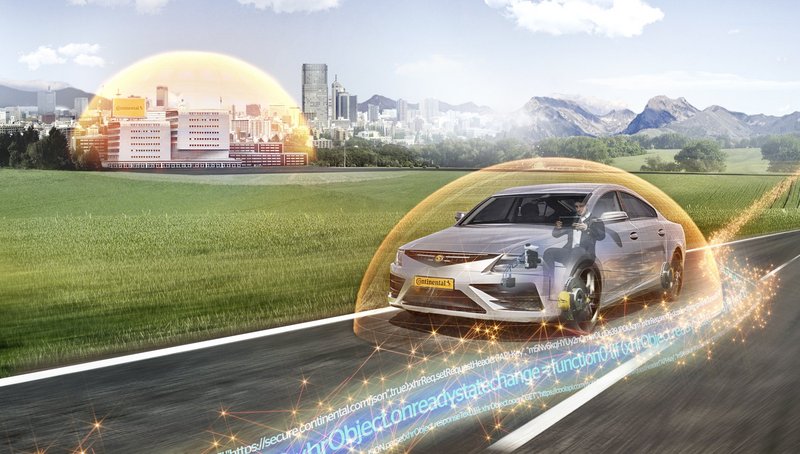Security at All Levels: Continental Protects Components and Production against Hacker Attacks
- Cyber security technology safeguards systems and safety-relevant components in vehicles against hacker attacks
- Security begins in the production plant: Production sites worldwide are set to receive a security upgrade
- Acquisition of Israeli startup Argus Cyber Security, Continental is further expanding its expertise in the field of automotive cyber security
Auburn Hills, Mich., March 23, 2018 – The trend towards digitalization, connectivity and automated driving means vehicles are becoming part of the Internet of Everything. However, vehicles today are already potential targets for hacker attacks, which is why the security of data and safety-relevant components is a current concern in the automotive industry. Of particular importance, for example, is the protection of safety-critical components such as the brake system. After all, to achieve the goal of accident-free driving or “Vision Zero”, vehicles and the infrastructure have to communicate with each other through digital connectivity. This, however, potentially opens doors for hackers, meaning that digital systems must not only be functionally reliable but also resistant to external attacks. As a result, the technology company Continental uses cyber security technology to ensure comprehensive protection against possible hacker attacks on safety-relevant vehicle components and in production plants.
“Our experts are working to bring security to the next level and safeguard our systems against hacker attacks, including the production security in our plants. The first production lines have already been equipped to integrate cyber security functions into the products,” said Robert Beaver, Chief Engineer Vehicle Dynamics at Continental. “Security affects every single vehicle component, which is why not only communication interfaces need to be protected but also – and especially – safety components such as brakes systems need to be as well.”
Cryptographic processes for a safety-relevant system have been implemented for the first time in the latest brake system, the MK C1. With the MK C1, the brake actuation feature, the brake booster and the control systems (ABS and ESC) are combined into a compact, weight-saving braking module. The MK C1 is more dynamic, lighter and more compact than conventional brake systems and has been specially developed for vehicles with extensive advanced driver assistance systems as well as recuperation and automated driving capability.
As the level of connectivity and the number of in-vehicle interfaces grow, this necessitates increase, and so does the risk of hacker attacks. Hackers are motivated by many reasons, which include data theft, financial interests and reputation. In response, Continental is strengthening all possible points of attack and implementing cyber security solutions on multiple levels and layers: on the first level, the individual electronic system components are protected; on the second level, communication between the in-vehicle systems is protected; on the third level, all the vehicle’s external interfaces are protected; and on the fourth level, data processing outside the vehicle is protected against theft and manipulation and also includes cloud and backend solutions. These offerings have been significantly augmented with the multiple end-to-end solutions provided by Israeli startup, Argus Cyber Security, which Continental recently acquired.
Individual security key for maximum security
All future products from Continental – including the MK C1 – will contain cryptographic functions that can be used to introduce security keys. These keys are generated individually for each product, which ensures maximum security — even if one car is hacked, a second one is still protected.
“The keys can be used for various operations and cannot be read externally, just like the PIN for your smartphone,” said Dennis Kutschke, Cyber Security program manager at Continental. “When it comes to cyber security, Continental also learns from the experiences and technologies in other industries. Cyber security is relevant to vehicle systems not only when they are integrated but also during the loading of software and digital keys— which is why a special production security concept valid for all locations is being introduced worldwide. The concept is based on a risk analysis conducted to identify weaknesses. Automotive manufacturers, too, benefit from being able to transfer their own keys to the system via the secure Continental network.”
Being quicker than the hackers
Cyber security is an asymmetric challenge. While Continental must keep its eyes on many systems, hackers need to identify a single weakness.
“It’s an ongoing race between the people who want to protect the systems and those that want to hack into them,” said Kutschke. “This is why it is so important to act as quickly as possible whenever any weakness is identified.”
Continental has introduced an incident response management system, which is an additional layer of security that responds immediately if there is an attack. This was developed with the expertise of Argus Cyber Security. Together with Elektrobit, which specializes in embedded and connected software solutions, the security experts have already unveiled an all-in-one solution for over-the-air software updates. This solution will ensure that millions of cars can instantly be upgraded to the latest security level without having to visit the auto repair shop, an important requirement for “Vision Zero” – a future without road deaths, injuries or accidents. Continental is also utilizing this knowhow to support car manufacturers in all matters relating to cyber security.
Continental develops pioneering technologies and services for sustainable and connected mobility of people and their goods. Founded in 1871, the technology company offers safe, efficient, intelligent and affordable solutions for vehicles, machines, traffic and transport. In 2017, Continental generated sales of €44 billion and currently employs more than 238,000 people in 61 countries.

Kathryn Blackwell
Vice President, Marketing & Communications

